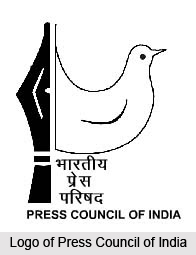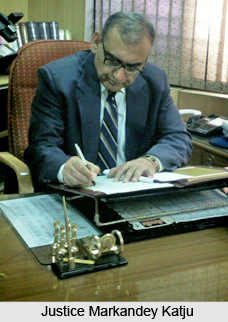 The Press Council of India was established in the year 1966 by the Parliament on the proposals of the First Press Commission. This council aims at preserving the freedom of the press and maintaining and improving the standards of Indian press. The present Press Council of India functions under the Press Council Act 1978. It is a constitutional, quasi judicial body which acts as a supervisory body of the press. It arbitrates the complaints against and by the press for violation of ethics and for violation of the freedom of the press correspondingly.
The Press Council of India was established in the year 1966 by the Parliament on the proposals of the First Press Commission. This council aims at preserving the freedom of the press and maintaining and improving the standards of Indian press. The present Press Council of India functions under the Press Council Act 1978. It is a constitutional, quasi judicial body which acts as a supervisory body of the press. It arbitrates the complaints against and by the press for violation of ethics and for violation of the freedom of the press correspondingly.
The Press Council is headed by a Chairman, who has by principle, been a retired and senior judge of the Supreme Court of India. The Council consists of 28 other members of whom 20 represent the press and are nominated by the press organisations or the news agencies. These organisations are recognised and notified by the Council as all India bodies of categories such as editors, working journalists and owners and managers of newspaper. Five members are nominated from the two houses of Parliament and three members represent cultural, literary and legal fields as nominees of the Sahitya Academy, University Grants Commission and the Bar Council of India. The members serve the Press Council of India for tenure of three consecutive years.
The Press Council of India collects its funds by revenue collected as fee levied on the registered newspapers in the country on the basis of their widespread circulation. However, no fee is levied on newspapers with circulation less than 5000 copies. The shortage is made good by way of grant from the Central Government, through Ministry of Information and Broadcasting.
The Press Council of India benefits the general viewers through its provision of lodging complaints against any newspaper. However, there is a particular complaints procedure in Press Council of India. If any individual has a complaint against a newspaper, for any publication which he/she finds objectionable and affects the person on personal basis, or non-publication of a material, one should first take it up with the editor or other representative of the publication concerned. Even then, if the complaint is not resolved satisfactorily, one may refer it to the Press Council of India.
 The complaint that shall be lodged to Press Council of India must be specific and in writing. The complaint should be filed within two months of the publication of impugned news item in case of dailies and weeklies and four months in all other cases, along with the original or photo copy of the impugned clipping. If the document is retrieved from any vernacular newspaper, it has to be translated in English. The individual must state in what manner the publication or non publication of the matter is objectionable within the meaning of the Press Council Act, 1978. One should also enclose a copy of the letter to the editor, pointing out why he/she considers the matter objectionable. His reply thereto or published rejoinder, if any, should also be attached to it. Declaration should be stating that the matter is not pending in any court of law is also required to be filed.
The complaint that shall be lodged to Press Council of India must be specific and in writing. The complaint should be filed within two months of the publication of impugned news item in case of dailies and weeklies and four months in all other cases, along with the original or photo copy of the impugned clipping. If the document is retrieved from any vernacular newspaper, it has to be translated in English. The individual must state in what manner the publication or non publication of the matter is objectionable within the meaning of the Press Council Act, 1978. One should also enclose a copy of the letter to the editor, pointing out why he/she considers the matter objectionable. His reply thereto or published rejoinder, if any, should also be attached to it. Declaration should be stating that the matter is not pending in any court of law is also required to be filed.
If a newspaper or journalist is upset by any action of any authority that may impinge on the freedom of the press, he/she can also file a complaint with the Press Council of India. The aggrieved newspaper or journalist may inform the Council about the possible reason for the action of the authorities against him and if it is as a punishment measure taken by the authorities due to critical writings or as a result of the policy that may affect the freedom of the press.
On receipt of a complaint made to it, if the Press Council of India is prima facie satisfied that the matter discloses sufficient ground for inquiry, it issues a show cause notice to the respondents and then considers the matter through its Inquiry Committee on the basis of written and oral evidence placed before it. If on inquiry, the Council has reason to believe that the respondent newspaper has dishonored or violated journalistic norms, the Press Council of India keeping in view the gravity of the misconduct committed by the newspaper, shall warn, admonish or censure the newspaper and at times may also disapprove the conduct of the editor or the journalist as the case may be. It may also direct the respondent newspaper to publish the contradiction of the complainant or a summary of the decision of Press Council of India in its impending issue.
Similarly, when the Press Council of India upholds the complaint of the distressed newspaper and journalist of the Council directs the concerned government to take appropriate steps to redress the grievance of the complainant. The Press Council of India may make such observations, if it considers necessary as it may think, in any of its decisions or reports, respecting the conduct of any authority, including Government.
The address for lodging complaints at Press Council of India is as follows -
The Secretary,
Press Council of India,
Soochna Bhavan, 8-C.G.O. Complex,
Lodhi Road, New Delhi-110003






